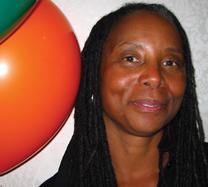Almost 200 women from all over Canada and the US filled the West End’s Coast Plaza Hotel Sep 4-7 for the fourth annual BOLD conference for lesbians aged 50 and over.
“There aren’t too many places where a bunch of lesbians can meet, have a good time and do a lot of workshops that are of interest,” says founder Pat Hogan.
“It’s been great having so many people together,” says first-time BOLD attendee Kaye Emmerson, who was visiting from Australia when she heard about the conference. Now she says she’ll make the trip to come back every year.
“It’s an experience that you don’t have every week, to have this number of women of a certain age drawn together,” she says.
Responding to criticism last year’s conference lacked diversity, Hogan and co-organizer Claire Robson approached Alice Walker’s biographer Evelyn C White to speak this year.
“People were just so moved by Evelyn White,” says Hogan. “What she had to say, who she is, her politics, but she’s also just such a wonderful, strong and direct woman. It really made a difference.”
“I applaud them for taking the feedback from past participants to heart,” says White of BOLD’s organisers. “I’ve felt extremely welcomed. People have told me, ‘I’ve come this year because you are speaking.'”
This year’s conference also featured a special tribute to late lesbian activist and author, Jane Rule.
Rule, an icon in the community and an Order of Canada recipient, passed away in her Galiano Island home last year due to complications associated with liver cancer.
“Jane was such a force in this community,” remembers White. “I think a lot of the women here are still sort of in that grieving space, and that’s, I think, a very difficult emotion to traffic in… They just wanted to tell old stories.”
Along with the discussion on Rule’s politics and life, BOLD’s program spanned everything from a blogging seminar to a riotous sexuality workshop and a lesson in flirting for seniors. But the most popular workshop was special creative writing session led by lesbian music hero, Ferron.
“We actually had to have a line-up for people to sign up on the sign-up sheet,” says Robson.
Janice Watson came from Portland, Oregon to attend BOLD, and was one of the 60 who managed to grab a spot on the list.
“She was showing us how to visualise before you write, to see the image before you think in words,” says Watson. “I think it’d be a real shame if she didn’t do anymore workshops because she’s just such an inspiring teacher.”
Ferron also played to a full hall Saturday night. An initially awed, meditative crowd rushed for the open space at the centre of the room as the icon “sang for her supper.”
Ferron’s performance was followed by a night of dancing that closed the conference, which organisers describe as a happy success overall.
“It’s about normalizing being old and being queer. It’s making it acceptable,” says Robson.
“I think women of all ages are either sexualised by the culture or rendered invisible,” says White, “and that’s sort of the two polarities. I believe this gathering provides an opportunity for women of a certain age to be visible in their own context, with their own stories, without apology.
“They’re just being who they are and coming as who they are. It’s a safe space for them. Many of them grew up at a time when to be openly gay was like a criminal offence, so it represents an honouring of them and their struggles.”
Though attendance numbers dropped a bit from last year — Hogan and Robson cite gas prices as one of the biggest issues — the conference was still well attended and the events, such as folk-star Ferron’s performance, popular.
Regular BOLD attendees did notice that some things had changed in the program though, such as the number of workshops offered. Some expressed concern about the slower pace and the lack of more academic content, but most, it seems, thought that was exactly what made this year’s conference so great.
“I’ve talked to women who say we’re too old to do that now and we don’t want to; we want time to reflect, be in this gorgeous settings with our friends,” says the 54-year-old White.
“To be able to honour the aging process and have it be okay to be able to say out loud, ‘I can’t walk that fast. I can’t listen to somebody talk for two hours. I can’t hear what you’re saying.’
“We’re not dead yet. We’re still here. You don’t have to apologise.”

 Why you can trust Xtra
Why you can trust Xtra


